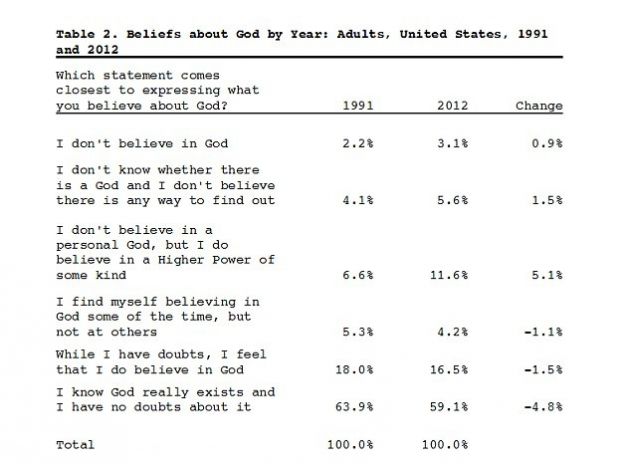1 in 5 people in US have no religious affiliation: Study
A new study finds that the number of people in the U.S. with no religious affiliation is at an all-time high, with 20 percent of adults claiming "no religion."
The data reported by researchers at the Institute for the Study of Societal Issues at University of California, Berkeley, after reviewing the 2012 General Social Survey.
Michael Hout and Claude S. Fischer from the University of California, Berkeley and Mark A. Chaves, from Duke University, reviewed the data for a new paper published on March 7.
They survey asks American adults: "What is your religious preference? Is it Protestant, Catholic, Jewish, some other religion, or no religion?"
In 1972, only five percent of people in the U.S. answered "no religion."
Eight percent of adults in the U.S. had no religious preference in 1990, but that number has more than doubled in two decades.
While 20 percent had no religious affiliation in 2012, only 3 percent would consider themselves atheists.
READ: Pew Study says 6 percent identify as Atheists or Agnostics in the U.S.
The researches found that Americans were more likely to agree with the belief in a higher God but remain uncomfortable with organized religion and tradition.
Research data showed a drop in the number of American adults who absolutely believed in God. In 2012, about 59 percent of respondents choose the following statement to expressed their belief in God: "I know God really exists and I have no doubts about it." In 1991, nearly 64 percent were sure of their belief in God.

Meanwhile, the number of respondents who said they don't believe in a personal God but in a "Higher Power" of some kind increased to 11.6 percent in 2012 from 6.6 percent in 1991.
Young adults were more likely than seniors to claim "no religion" to describe their preference. Among those aged 18-24, 32 percent said they had no religious affiliation, compared to 7 percent of people 75 and older.
The number of people who had no religious affiliation were skewed toward those living in Mountain, Pacific and Northeast areas.
Not surprisingly, adults living in the Bible Belt and the Heartland were more likely to claim a religion.
Among ethnic groups, white Americans were less likely to be religious than African Americans and Mexican Americans, a majority of whom are Catholic.